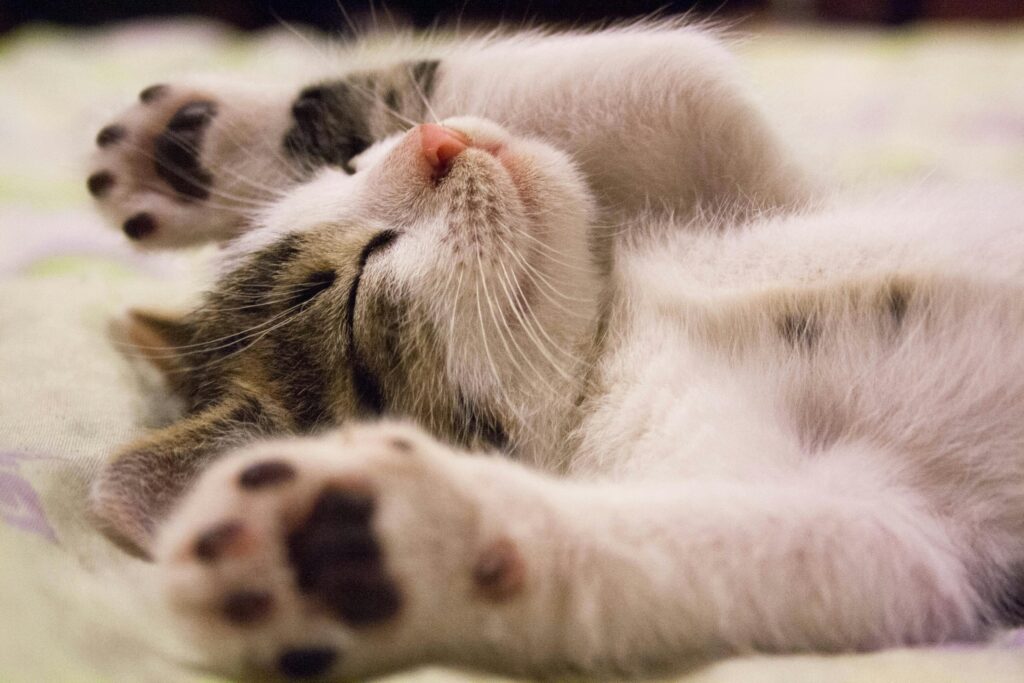Why Your Cat Is Meowing at Night (and How to Stop It)
If your cat is meowing at night and turning into a midnight singer, you’re not alone. Feline night vocalizations are one of the top complaints from cat parents. The good news? It’s usually fixable once you understand the cause. In this guide, we’ll break down why cats meow at night, what it means, and the practical steps you can take to restore your sleep.
1) Hunger or Habit
Clue: Your cat sits near the food bowl or kitchen at predictable times, often before dawn.
Fix: Feed a small, protein-rich meal before bed. Consider an automatic cat feeder to release food at 4–5 a.m. so your cat doesn’t wake you.
2) Boredom & Excess Energy
Clue: Zoomies at 2 a.m., random pouncing on your toes.
Fix: Schedule 2–3 interactive play sessions daily (10–15 minutes each) with wand toys or laser pointers. Add a puzzle feeder or treat-dispensing ball to keep your cat’s brain engaged while you sleep.
3) Attention-Seeking
Clue: The meowing stops as soon as you get up and look at your cat.
Fix: Ignore the behavior at night. Reward attention during the day with petting, brushing, or training games. Reinforcing silence—not noise—teaches your cat better patterns.
4) Anxiety or Environmental Change
Clue: Your cat recently moved homes, gained a new pet sibling, or shows signs of stress (pacing, hiding).
Fix: Keep a consistent routine. Add vertical spaces like cat trees, perches, and cozy hiding spots. A pheromone diffuser (like Feliway) can ease anxiety and reduce vocalization.
5) Medical Causes
Clue: Night meows paired with weight loss, increased thirst/urination, or confusion (especially in senior cats).
Action: Schedule a veterinary check-up. Common conditions include hyperthyroidism, pain, high blood pressure, or cognitive dysfunction. Medical issues should always be ruled out first.
Night-Time Survival Plan
- Pre-bed play + meal: Cats follow the cycle hunt → eat → groom → sleep. A good play session followed by food helps them settle.
- Environment: Offer scratching posts, cat condos, and a soft, warm bed away from your room.
- Reduce triggers: Use white noise to mask outdoor sounds and blackout curtains to limit early morning light.
- Ignore the meows: Consistency is key. If you give in once, your cat learns meowing works.
When to Call the Vet
If your cat’s night meowing is sudden, severe, or paired with other symptoms (weight change, drinking more, peeing more, disorientation), don’t wait—book a vet visit. Cats are masters at hiding pain, and vocalization may be one of the first signs.
Frequently Asked Questions (FAQ)
Should I ignore my cat meowing at night?
Yes—if you’ve ruled out medical issues. Responding reinforces the behavior. Instead, give attention during the day.
How do I get my cat to sleep through the night?
Increase evening play, feed before bed, and set up a comfortable environment. Automatic feeders can help with early-morning wake-ups.
Is night meowing normal in older cats?
Senior cats may meow more due to cognitive changes, vision/hearing loss, or illness. Always consult a vet for seniors with new vocal patterns.
Recommended Products
- Feliway Diffuser – helps reduce stress-related meowing.
- Automatic Cat Feeder – prevents 4 a.m. wake-up calls.
- Puzzle Toys – burn energy and keep cats busy at night.
More cat care: Explore our Cats Hub or read our Vet-Approved Cat Food Guide. You may also enjoy our Dog Tech & Gadgets Guide for pet households with both cats and dogs.
tags: cat meowing at night, stop cat meowing, why is my cat meowing, nighttime cat behavior, excessive cat vocalization

